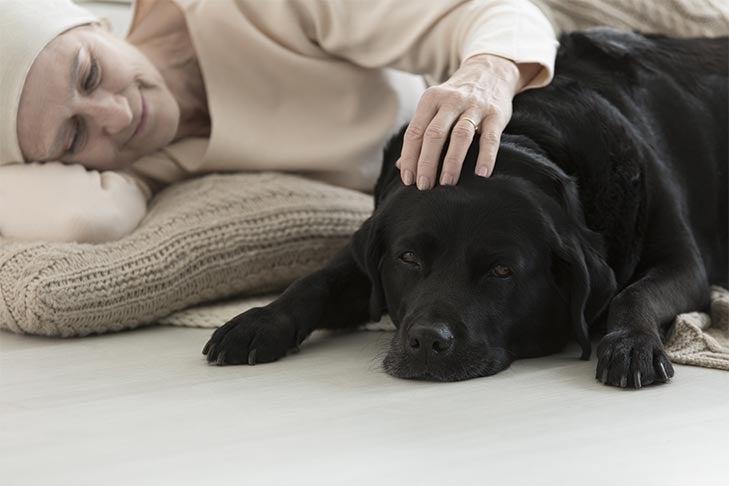- Don’t wait -- it’s best to plan ahead and designate who will care for your dog if you can’t.
- Make sure others know what arrangements you’ve made.
- Consider leaving some money for your dog’s care if you’re able.

When you get a dog, you commit to providing loving care throughout your canine companion’s lifetime. For a responsible owner, this includes planning who will care for your dog if you become incapacitated or die before the dog does.
This is not a happy thought, but if you take the necessary and proper steps to figure it out, you will sleep better at night knowing you’ve provided for your best canine friend, no matter what happens to you.
Consider Breeder Contract Requirements
If you bought your dog from a reputable breeder who had you sign a contract, chances are there’s a provision in the contract that covers what happens to your dog if something happens to you. Many contracts stipulate that in case of your death, the dog is to be returned to the breeder, who will find it a good home. Breeder contracts with reasonable requirements are legally enforceable.

Life happens to the best of us — including illness and death — and the breeder wants to be notified. Many breeders may agree for the dog to live with another loving family member or close friend, but will still want to know about any change of ownership. They want the new owners to understand that they are available to provide guidance and advice. Breeders also want to know if any problems develop throughout the dog’s lifetime.
Decide What Will Happen
If you haven’t signed a contract with a breeder who will take responsibility for your dog, or you would like the breeder’s permission to plan a new home for your dog with someone who already loves her, here’s what you should consider.
Who will love and care for your dog? It’s important not to assume that your family members would want your dog on a permanent basis. Leaving your dog to someone should not be a surprise. Talk to the people you’re considering and be sure they really are willing to take your pet and are capable of caring for him.
Next, find an alternate. Your first choice person might move away, retire and travel, or encounter other changes in circumstance. So it’s a good idea to identify a second, backup caretaker. And if the people you have chosen don’t live close by, you might want to designate a neighbor who is willing to care for your dog briefly in an emergency until your long-term provider can get there.
Provide both caretakers with documented proof that you’ve chosen them. The people you choose must have access to a legal paper declaration from you that will be accepted as giving them permission to rehome the dog. In an emergency situation, they may be required to show this to a shelter in order to have the dog released to them.

Make It Legal
In the eyes of the law, your pet is an item of property, and when you die, he will have a new owner. You can make your decision on who that new owner should be legally binding by including it in your will or living trust.
A pet provision in your will or trust will specify who should care for your dog when you are gone and can also set aside funds for the care of your dog. We all know that providing proper care for our dogs can get expensive, so if you are able to, leaving some money to the person you’re trusting with your dog to cover those costs is a good idea.
Pet provision statements included in your will can be very simple. For example:
- If I am incapacitated or die and can no longer care for my dog, Molly, I leave her to my friend Jane Doe. If Jane Doe can’t care for Molly, I leave her to my friend Bob Smith.
- If my dog, Molly, is alive at my death or I become incapacitated, I leave her and $10,000 to be used for her care to Jane Doe. If Jane Doe is unable to care for Molly, I leave the dog and the $10,000 to be used for her care to Bob Smith.
This article is not meant to provide legal advice. State laws pertaining to animals and trusts vary, so consulting a lawyer in your state is the best insurance that you’re doing it correctly.
Inform Others of Your Wishes
It’s important to make absolutely sure that your close relatives and friends know what arrangements you’ve made, so your dog doesn’t end up in a shelter, even temporarily, when he’s already confused about where you are.
The National Institute on Aging advises getting your affairs in order now. Most people don’t plan to get sick or die, but emergencies happen. Being prepared can give you some peace of mind. Here’s what they recommend:
- Put all of your important papers in one place, and let at least one trustworthy person who is close to you know where to find them. Be sure to keep them up-to-date.
- Include information about your dog: breeder contact information, designated pet provider, veterinarian, health, and care information.
- The file should include the name of your lawyer, executor, or whomever will be responsible for making sure your wishes are carried out.
Another way to protect your pets is to make sure contact information for someone who can care for them is readily visible to anyone who comes into your home to help you in an emergency. Post it on your refrigerator, bulletin board, and emergency contact list. You can also carry a wallet pet emergency card that will alert caregivers that you have a pet at home and whom they can contact.
Don’t procrastinate – make plans for the care of your pets as soon as possible. You’ll rest easier knowing they’ll be loved and cared for until they die, no matter what may happen to you.


